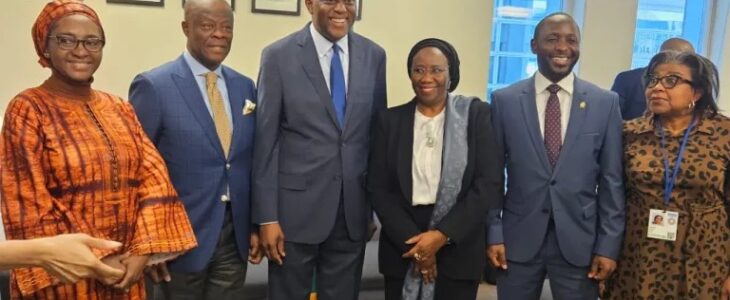
The Governor of the Central Bank of Nigeria (CBN), Mr. Olayemi Cardoso, yesterday in Washington DC stated that having addressed concerns raised by International Money Transfer Operators (IMTOs) and with the assurances from Nigerians in the Diaspora, the apex bank was confident that it would attract $1 billion monthly remittances.
Cardoso stated this at a joint press conference with the Minister of Finance and Coordinating Minister of the Economy, Mr. Olawale Edun, at the end of the International Monetary Fund (IMF) and the World Bank Annual Meetings.

The CBN governor, who said the apex bank was working assiduously to get Nigeria out of the grey list, added that remittances, which were a little above $250 million as of April this year, increased to over $600 million as of September this year.
This is just as Edun has declared that the bold reforms of President Bola Tinubu’s administration were yielding the desired results.
According to Cardoso, “Nigeria has such a strong diaspora community here; in the earlier stages of the reforms, IMTOs were having issues transferring money back to Nigeria, and we felt it was important to engage them, and we did. As a result of that engagement, we identified particular problems, of which a lot of responsibility was shared. Things have since improved because as at the last meetings, which was, I think, April, monthly inflows were about $250 million, but as of September, it had risen to $600 million.

support of our key stakeholders, including investors, banks, Nigeria diaspora, and businesses with our counterparts on the fiscal side, we have strengthened collaboration over the past year by establishing several joint committees. These committees are designed to drive actionable outcomes, creating impactful platforms for stakeholder engagement and delivering concrete solutions to align monetary policy with fiscal operations more effectively. I’m confident that with our collective efforts and sustained commitment, we can pave the way for a more prosperous Nigeria that fosters robust and inclusive growth,” he said.
Also speaking, the Minister of Finance and Coordinating Minister of the Economy, Edun said the bold reforms embarked upon by President Tinubu were yielding the necessary results.
“It has been a very interesting week of conversation at the highest level about the world economy, the status, direction, and various inputs as to the policy restrictions. We all agree that there is a need to combat inflation, for most of Europe, they are close to their target level of two per cent. Their economy is gradually recovering, and as a result, is gradually easing their monetary positions, which were very tight.
“In the advanced economies with inflation trending down, interest rates are also coming down and that is good news to those that have to go to the market to borrow money. For us in emerging markets and developing economies, there is still relatively high inflation and the majority view at this time is that interest rates have to remain high.
“At the same time, debt levels are clearly escalated and care has to be taken there and in addition, growth is low. So, we try to make sure that inflation is low, which needs to be combated as a priority because of the negative effect it has on purchasing power. But critical investments have to go on to ensure growth because, at the end of the day, it is growth, job-creating growth that will lead to poverty reduction,” he said.
Credit: This Day
